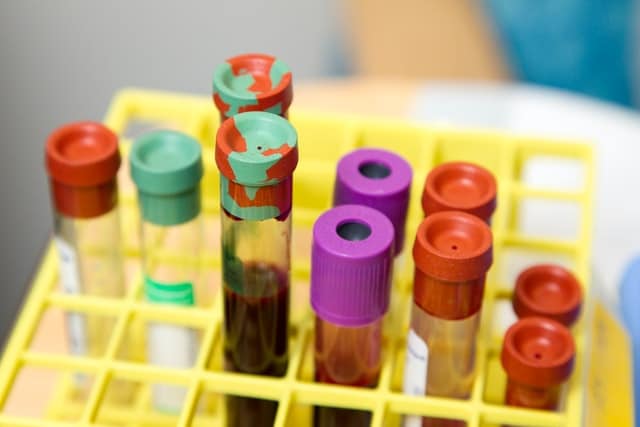The SYNTap Test, a new biomarker test to help diagnose diseases like Parkinson's, Lewy body dementia and Multiple System Atrophy, is now on the market in most U.S. states.
Diagnosing degenerative brain diseases early and accurately is a major challenge, and it can take years before a patient receives an accurate diagnosis. But with cutting-edge technologies, scientists are developing novel ways to measure biomarkers like misfolded proteins to identify diseases like Parkinson’s and Lewy body dementia faster — and more accurately.
The SYNTap Test is one such test, and now it’s commercially available in most U.S. states. According to the test’s maker Amprion, the SYNTap Test aims to aid clinicians in diagnosing Parkinson’s, Lewy body dementia and Multiple System Atrophy, and to help differentiate these diseases from Alzheimer’s.
The SYNTap Test currently costs $1,500 per lab test, and Amprion is working to establish reimbursement from private insurance providers, Medicare and Medicaid. Meanwhile, the Food and Drug Administration granted its breakthrough designation to Amprion’s technology in 2019 to help diagnose Parkinson’s and Lewy body dementia, accelerating its development and prioritizing the review of the company’s regulatory submissions.
Amprion’s CEO and Co-founder Russell Lebovitz said the symptoms of various brain diseases often overlap, and misdiagnosis occurs anywhere from roughly one sixth to as much as half the time.
“Waiting years for a final diagnosis is not just an inconvenience,” Lebovitz told Being Patient. “It is a lost opportunity … The more symptoms get worse, the more irreversible damage you get in the brain. Time is life. Time is money. Time is everything.”
The test is based on the Seed Amplification Assay and designed to detect accumulations of alpha-synuclein from the cerebrospinal fluid. These misfolded proteins characterize Parkinson’s, Lewy body dementia and Multiple System Atrophy, brain diseases collectively known as synucleinopathies.
In an ongoing research study, Amprion’s Associate Director of Research and Development Luis Concha and his team analyzed cerebrospinal fluid samples of 74 patients with synucleinopathies. They found that the Seed Amplification Assay detected 70 patients as positive for alpha-synuclein aggregates. It also identified 49 out of 50 samples of healthy, control patients as negative.
Following these results from Amprion’s research and development team, the company’s laboratory performed an analytical and clinical validation, including 164 samples confirmed by the DaTscan diagnostic tool, with 55 samples from patients with Parkinson’s and 109 samples from patients without neurodegeneration. The assay performed at 93.9 percent accuracy, 87.3 percent sensitivity and 97.2 percent specificity, compared to the DaTscan.
Meanwhile, for the ongoing research study, Concha and his colleagues analyzed samples of 28 people with isolated rapid eye movement behavior disorder, which can be a symptom of prodromal Parkinson’s. In this stage of the disease, people experience the early signs and symptoms of Parkinson’s without its cardinal features, like tremor, rigidity and slowness of movement. According to Concha, the assay detected 26 people as positive, including eight whose samples were collected up to eight years before they developed Parkinson’s or Lewy body dementia.
In the case of Alzheimer’s, even though amyloid plaques and tau tangles are the hallmark proteins of the disease, past research has shown that up to 60 percent of patients actually have aggregates of alpha-synuclein in their brains at autopsy. So, Concha and colleagues are conducting a separate study on the assay’s ability to detect these aggregates in Alzheimer’s patients during life, and he said early results seem encouraging.
“Overall, our preliminary results show that we can stratify [Alzheimer’s disease] patients while they are alive, based on the detection of synuclein aggregates in [cerebrospinal fluid], which acts as a little window for us to see what’s going on in the brain,” Concha wrote in an email.
In an interview, Concha said an early diagnosis is critical. For one, he said it enables patients to plan ahead for managing different aspects of daily life, such as finances and home remodelling. Patients can also implement lifestyle changes to manage their symptoms and potentially slow the progression of their symptoms. Further, Concha added, a timely diagnosis with the aid of the SYNTap Test opens a window of opportunity for patients to enroll in clinical trials, helping scientists develop effective treatments.
Update: The article has been updated with data of the assay’s clinical performances, in addition to the research and development performances that were initially published in this story.



